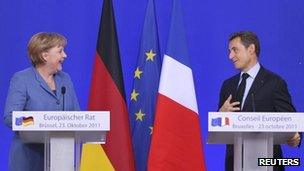Will propping up Italy weaken France?
- Published
- comments

European leaders will meet again on Wednesday
If you are puzzled that share prices are rising, in the face of painfully slow progress by eurozone governments on agreeing measures to ward off acute financial crisis, it is that investors have been comforted by data out of China and Japan that show global economic growth has not petered out altogether: Japanese exports were a bit stronger in September than expected; the mood among surveyed Chinese purchasing managers has improved in the past few weeks, and now signals increased private sector activity.
It is striking that investors are looking for reasons to make riskier investments (buying shares, for example), which most would see as a good sign - although this would be self-defeating if it provided false signals to European government heads that they need to be less bold and ambitious in constructing a three-pronged rescue package for the eurozone.
The point is that, after all the hours of horse-trading and haggling this weekend, eurozone leaders still have two very big decisions to make by close of play on Wednesday: the amount that private sector creditors should reduce or write off what they're owed by the Greek government; and the method for increasing the size of the bailout fund, the European Financial Stability Facility (EFSF), so that it has sufficient resources to do all the things it needs to do, such as lending to countries shut out of markets and providing finance to banks in need of capital (and see my notes over the past few days for more on all this).
On the bailout fund, one potentially dangerous choice has been made. Germany has persuaded the rest that the resources of the European Central Bank should not be deployed alongside those of the EFSF.
Instead, the EFSF will provide guarantees either to a new fund, that could lend to eurozone governments unable to borrow elsewhere, or could guarantee direct loans to such governments.
What this means is that eurozone taxpayers, and especially those in Germany and France, will be more directly exposed to future emergency loans that may be required by the likes of Italy and Spain than would be the case if part of those loans was provided by an ECB able to create money.
So even if the size of the EFSF is capped, the impression may well be created that French and German taxpayers have made an uncapped commitment to prop up Italy and Spain - which would infect the perceived strength of the French and German balance sheets.
Finding new funds
For France, in particular, there is a growing risk that it will lose its AAA credit rating. And if that were to happen, there is a danger that its cost of borrowing would rise and its banks would be seen as weaker. So saving Italy and Spain could create a sizeable headache for France (which may explain why President Sarkozy seems to be a bit tetchy).
None of which is to belittle the importance of European governments agreeing that their banks need to raise €110bn or so in new capital.
It may not be the €200bn favoured by some regulators, such as the UK's Financial Services Authority, but it represents a very significant shift by European governments away from their position that their banks are tickety boo and that all suggestions to the contrary are the malevolent and wrongheaded slurs of British and American speculators.
For what it's worth, the precise calculation of the size of the capital deficit given to European finance ministers by the European Banking Authority on Saturday was €108bn - though this number could still move around, I am told, before formal announcement.
Of this €110bn, around €50bn will have to be raised by banks in countries whose governments are already in receipt of emergency help from the eurozone and IMF, namely Ireland, Portugal and Greece - and the biggest chunk of this will be needed by Greek banks. So it is a pretty fair bet that most of the €50bn will have to come from the EFSF.
A substantial sum - probably more than €30bn - is needed by Spanish banks and Italian banks, which are massive lenders to their respective governments, the price of whose debt is well below par. And whether they will be able to raise all of that from commercial investors and Spanish taxpayers is moot, so there may be a further call on the EFSF.
Finally, German and French banks will have to raise billions of euros in new capital. The investment bank Morgan Stanley estimates that Germany's Deutsche Bank may need €5bn, whereas the French banks BNP Paribas, Credit Agricole, BPCE and Societe Generale may each need between €2bn and almost €4bn.
Most of the French and German capital deficit should be remediable through selling shares to investors or selling non-core assets, without recourse to taxpayers.
All that said, there is now a big responsibility on European regulators to ensure that banks meet the targets by obtaining new capital relatively fast - and that they veto what many banks will instinctively wish to do, which is to hit the new higher 9% ratio of capital to assets by lending less (which would have the effect of reducing the denominator in the ratio, the asset figure).
With the European economy perilously close to a new recession, this would not be the ideal moment for banks to curb the availability of credit.